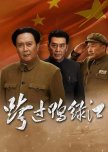Dong Bei Fa
Stop me if you've heard this before: the empire once divided seeks to be united. Alas, barbarians lurk on the periphery trying to invade the Central Plains. A great northern expedition is necessary! Hell, when I close my eyes, I hear the echoes of Zhuge Liang's Northern Expedition memorial: He crossed the Lu, so Mao Zedong, Peng Dehuai and the volunteers of the People's Republic had to go Across the Yalu River.
The show is a faithful rendition of the Korean War from the perspective of the People's Republic. It operates at four levels:
1. A news-reel style narration to fill in important information that couldn't be dramatised
2. War room dialogue featuring the principal political and military leaders
3. Battlefield command scenes where upcoming battles are planned
4. Battlefield scenes where soldiers charge, bombs fly and acts of heroism and sacrifice abound
It's all competently helmed, nothing memorable, distinctly average. The grand theme of the show is the struggle between mass and machine. The Chinese side are distinctly overmatched in industrial output and quality against the UN troops. However, the volunteer's force is possibly the most powerful and battle-tested force in China's long history. Except in the early stages of the war, when the overconfident UN troops are taken by surprise, it's scene after scene of superior UN armaments blowing Chinese to smitheerens. I gather it's meant to be heroic, and I could see it in the abstract. But seeing it unsubtly represented onscreen, my reaction was dismay at such waste. What was the point of it all?
That is a question the show struggles to answer. The Americans bombed China and seemed committed to driving the Inmingun straight into China. But the show didn't make me care. It seemed too much in a rush to get to the battle scenes that it forgot the human factor. The complete absence of Koreans as protagonists in the show also didn't help. The war scenes were competently executed spectacles although the special effects were lacking in some areas.
The story of the Yalu River intervention naturally makes an excellent drama. Alas, this production doesn't do it justice.
The show is a faithful rendition of the Korean War from the perspective of the People's Republic. It operates at four levels:
1. A news-reel style narration to fill in important information that couldn't be dramatised
2. War room dialogue featuring the principal political and military leaders
3. Battlefield command scenes where upcoming battles are planned
4. Battlefield scenes where soldiers charge, bombs fly and acts of heroism and sacrifice abound
It's all competently helmed, nothing memorable, distinctly average. The grand theme of the show is the struggle between mass and machine. The Chinese side are distinctly overmatched in industrial output and quality against the UN troops. However, the volunteer's force is possibly the most powerful and battle-tested force in China's long history. Except in the early stages of the war, when the overconfident UN troops are taken by surprise, it's scene after scene of superior UN armaments blowing Chinese to smitheerens. I gather it's meant to be heroic, and I could see it in the abstract. But seeing it unsubtly represented onscreen, my reaction was dismay at such waste. What was the point of it all?
That is a question the show struggles to answer. The Americans bombed China and seemed committed to driving the Inmingun straight into China. But the show didn't make me care. It seemed too much in a rush to get to the battle scenes that it forgot the human factor. The complete absence of Koreans as protagonists in the show also didn't help. The war scenes were competently executed spectacles although the special effects were lacking in some areas.
The story of the Yalu River intervention naturally makes an excellent drama. Alas, this production doesn't do it justice.
Was this review helpful to you?







